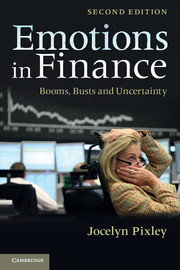Book contents
- Frontmatter
- Contents
- Acknowledgements
- Abbreviations
- Interviews
- Introduction
- 1 Modern money, modern conflicts
- 2 Corporate suspicion in the kingdom of rationality
- 3 Financial press as trust agencies
- 4 Required distrust and the onus of a bonus
- 5 Managing credibility in central banks
- 6 Hierarchies of distrust from trust to bust
- 7 Overwhelmed by numbers
- 8 The time-utopia in finance
- 9 Taming the god of opportunism
- References
- Index
6 - Hierarchies of distrust from trust to bust
Published online by Cambridge University Press: 05 June 2012
- Frontmatter
- Contents
- Acknowledgements
- Abbreviations
- Interviews
- Introduction
- 1 Modern money, modern conflicts
- 2 Corporate suspicion in the kingdom of rationality
- 3 Financial press as trust agencies
- 4 Required distrust and the onus of a bonus
- 5 Managing credibility in central banks
- 6 Hierarchies of distrust from trust to bust
- 7 Overwhelmed by numbers
- 8 The time-utopia in finance
- 9 Taming the god of opportunism
- References
- Index
Summary
This chapter shows how the financial sector creates the booms, which collapse from distrust in complex and unpredictable ways. True, central banks could be less frightened about their credibility to ‘markets’ than they have been for the last forty years. Conventional accounts blame ‘authorities’ for booms and busts, but financial crises are not, directly, created by the central banks that appease banks ‘to order’.
Instead of a bleak offering, however, I compare decent actions of banks, central banks and money funds that expose the dissimulation, the laughable nature of ‘self-regulation’ and the deference by authorities. That is, there are at present, not in some ‘golden age’, opposing tendencies inside the sector. As well, each institutional type has ups and downs. Many collapses are not synchronised; sub-sectors pull in different directions. The Dotcom bust exposed equity scams, but the 2007 UK/US financial crisis hit banks, insurance companies, you name it. There is no normality. Hubris and glee are profitable emotions to restore a tattered sub-sector's reputation, like the self-righteous finger-pointing by hedge funds in 2008, claiming they didn't cause the ‘subprime’ fiasco. Trust changes, collapses or motivates decent acts.
Producers of money that claim ‘risk-free’ strategies create the booms. Banks and money funds shift places; casualties are taken. Credit-rating agencies climb to the top of the ‘distrust status’, only to drop every few years. Reputation ups and downs of central banks are nothing to credibility failures in the private sector. The City evaded rules way back in the 1950s. Regulators are not ‘asleep at the wheel’ so much as defunded and bet against. The blame and praise are politics without democracy. In finance, conflicts are presented as orthodox rationalisations, driven by spite, envy and distrust.
- Type
- Chapter
- Information
- Emotions in FinanceBooms, Busts and Uncertainty, pp. 164 - 191Publisher: Cambridge University PressPrint publication year: 2012



